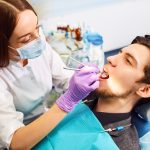Basic Oral Hygiene Tips
When you and your Fairview dentist work together to meet the threats and challenges oral health care provides, you are sure to find the winning recipe. And the prize for winning can be a very valuable one. With the right mix of self and professional care, you can look forward to less tooth decay and damage, and improve your chances of combatting or avoiding illnesses linked to poor oral health.
Be careful what you eat and drink:
Watch what goes in your mouth: It doesn’t matter how sweet or tasty those sugary and acidic drinks and foods are. It also doesn’t matter if you give in to having them every now and again. What does matter is that you do so in moderation. And make sure to rinse your mouth with water about half an hour after eating or drinking these items.
Your teeth are not tools:
Use your teeth to chew your food and to start breaking it down for easier digestion. They are not bottle-openers or a wide pair of scissors.
Drink enough water:
Water helps refresh the saliva which breaks down food particles and neutralizes acids. If your mouth is dry, the plaque build-up increases, bacteria clusters and the acid can weaken your teeth by damaging the protective enamel.
Clean correctly:
Make cleaning your teeth part of your daily routine. Allow two minutes twice a day to brush your teeth with a soft brush. Use a gentle up and down action. Don’t hang on to your toothbrush for too long. Rather replace it every few months so that it remains effective.
After brushing, remember to floss between your teeth using floss or an interdental brush. And don’t forget about your tongue. Clean it from the back of your mouth towards the front using a tongue scraper or your toothbrush. Then finish up with a mouthwash recommended by your dentist.
Use the experts:
Make sure to have regular dental cleanings to deal with areas and situations that are beyond the scope of a normal toothbrush. A dentist or hygienist will have the knowledge and the implements to clean below the gum line, and the ability to remove plaque and hardened tartar that you can’t manage yourself.
Be alert:
While brushing your teeth be aware of any changes in your mouth. If you experience any discomfort, your gums are suddenly sensitive, red, or swollen, or if your see swellings in your mouth, contact your dentist.
Have regular check-ups:
Give your dentist a chance to help you. Schedule regular check-ups (every six months or so) so that he or she can make sure all is well. There is a far greater chance of a positive outcome if problems are caught while they are still potential problems, and not yet firing on all cylinders
Prevent gum or periodontal disease:
Adhering to a routine oral hygiene programme increases your chance of avoiding gum or periodontal disease. Gum disease not only threatens your teeth, and the bone that supports them, but also puts your general health at risk.
While at your regular check-up, speak to your dentist about your oral hygiene program and ask for advice on how you can improve it. New ideas on oral care are always emerging, and you can trust your dentist to be up-to-date on dentistry practices and protocols.





